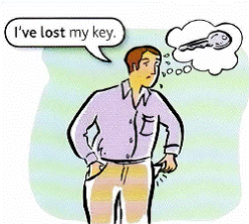Збірник граматичних вправ для учнів 5 класу "The Present Perfect Tense"
THE PRESENT PERFECT TENSE
Present Perfect – теперішній доконаний (перфектний) час англійської мови. Цей час вживається для вираження дії, що вже завершилася на момент розмови, але її результат є видимим.
Теперішній доконаний час (Present Perfect) пояснює дію, яка відбулася в минулому, проте має безпосереднє відношення до сьогодення (теперішнього часу), тобто є актуальною зараз.
Для Present Perfect речення у стверджувальній формі формується за допомогою дієслів has (для he/she/it) та have (I/you/we/they) з додаванням до нього закінчення ed. Якщо використовується неправильне дієслово, то воно вживається у 3 формі. Скорочена форма виглядає так: they’ve, I’ve та інші.
|
You We They |
have |
V3/V(ed) |
|
He She It |
has |
We have bought a new house. – Ми купили новий будинок.
He has typed all his letters. – Він надрукував усі свої листи.
Для утворення заперечного речення в Present Perfect після допоміжного дієслова необхідно додати частку not.
|
I You We They |
haven’t |
V3/V(ed) |
|
He She It |
hasn’t |
He hasn’t washed his car yet. – Він ще не помив свою машину.
I haven’t seen them since last year. – Я не бачив їх з минулого року.
Для утворення питального речення в Present Perfect допоміжне дієслово необхідно ставити наперед речення.
|
Have |
I you we they |
V3/V(ed)? |
Yes, I (you, we, they) have. / No, I (you, we, they) haven’t. Yes, he (she, it) has. / No, he (she, it) hasn’t. |
|
Has |
he she it |
Has Ann phoned yet? – Енн вже дзвонила?
How long have you known Mary? – Як давно ти знаєш Мері?
Вживання Present Perfect
1. Present Perfect вживається в описі минулої події, яка має зв’язок із теперішнім часом (дія відбулася в минулому, однак її результати існують або відчуваються досі). При цьому не зазначається конкретний момент часу в минулому, коли така подія відбулася.

He has lost his key. Now he can’t open the door.-Він загубив свої ключі. Тепер він не може відчинити двері.
2. Для вираження минулої дії пов’язаної з теперішнім часом, якщо в реченні немає будь-яких обставин часу.

I have fallen off a bike. – Я впав з велосипеда.
3. Якщо в реченні вказується період часу який все ще не закінчився до моменту мови, в них часто використовують такі слова і прислівники як today – сьогодні, this week – на цьому тижні, this year – в цьому році, this month – в цьому місяці, this decade – в цьому десятилітті, this century – в цьому столітті, this millennium – в цьому тисячолітті.

I have read a lot of books this month. – Цього місяця я прочитала багато книг.
4. Якщо в реченні присутні такі обставини часу, які вказують на період, протягом якого відбувалася дія(починаючи з певного моменту в минулому і до теперішнього часу): up to now-до цих пір, for an hour – протягом години, for two weeks – протягом двох тижнів, for a long time – протягом довгого часу, since twelve o’clock – з дванадцятої години, since May – з травня

We have not seen each other for ages. – Ми не бачилися один з одним цілу вічність.
Допоміжні слова Present Perfect
При утворенні речень в Present Perfect часто вживаються допоміжні слова. Ці слова-маркери теперішнього доконаного часу наведені нижче:
ever (коли-небудь); never (ніколи); already (вже); not… yet (ще не); just (тільки що); before (перш ніж, до того, як…); lately (останнім часом); recently (нещодавно); for (протягом); since (з тих пір); several times (декілька разів); How long? (Як давно?)
Обставини часу, як правило, розташовуються між допоміжним та основним дієсловом (just, already, ever, never тощо) або в кінці речення (today, yet, so far, this week тощо).
I have already seen this film. – Я вже бачив цей фільм.
He has been to Paris twice. – Він був у Парижі двічі.
How long have you known Mary? – Як давно ти знаєш Мері?
Yet вживається тільки в заперечних та питальних реченнях.
Наприклад:
He hasn't been to London yet. – Він ще не був у Лондоні.
Have you had breakfast yet? – Ти вже поснідав?
Have you finished your report yet? – Ти вже закінчив свою доповідь?
«For» чи «since»?
Прийменник since в обставинах часу вживається для позначення початку дії в минулому:
I have worked here since last year. – Я працюю тут з минулого року.
I’ve studied English since my childhood. – Я вивчав англійську мову з дитинства.
He has known her since they were five years old. – Він знає її з п’яти років.
Прийменник for в обставинах часу вживається для позначення періоду, протягом якого відбувалася дія до теперішнього часу.
He has known my brother for two years. – Він знає мого брата два роки.
I have lived in London for a long time. – Я прожив у Лондоні довгий час.
I have worked for this company for more than five years. – Я працював на цю компанію більше п’яти років.
|
for |
since |
|
For – протягом |
Since – з; з моменту |
|
For 20 minutes For 3 days For 5 years For a long time For 2 weeks For an hour For many centuries
|
Since last year Since 5 o’clock Since last Friday Since yesterday Since I was 19… Since I left school Since the beginning of …
|
Practise
1. Заповніть пропуски вживаючи since або for.
________ Sunday
________ yesterday
________ ten days
________ 2010
________ October
________ four months
________ last week
________ six weeks
________ ten minutes
________ two o’clock
2. Вставте since або for.
1) Tom has lived here _________ last year.
2) Tom has lived here _________ five years.
3) John has had the car_________ last month.
4) He has had the car _________ eight months.
5) Monica has had the driving license _________ she was twenty.
6) Steven has been a journalist_________ he left school.
7) We have had three tests _________ Monday.
8) They have stayed here _________ three days.
9) My parents have lived in this house _________ 1995.
10) He _________ Christmas.
3. Поставте дієслова в дужках у Present Perfect.
1) He _____ (finish) working.
2) This is the first time he_____ (drive) a car.
3) She _____ (buy) a very nice dress today.
4) Oh, no! I _____ (lose) my money!
5) She_____ (see) this film eight times.
6) What a boring film! It’s the most boring film I_____ ever_____ (see).
7) Look! Somebody____ (spill) milk on the carpet.
8) Jack ____ (study) very much this month.
9) They ____ (know) each other since they were at school.
10) Sam's my best friend. I_____(know) him for five years.
4. Поставте дієслова в дужках у заперечну форму Present Perfect.
1) I _____ (not clean) my room.
2) They _____ (not finish) their work yet.
3) I _____ (not see) Tom this morning.
4) He ____ (not write) me for nearly a month.
5) It's my birthday party today. I _____ (not invite) many people.
6) She _____ (not buy) a car yet but she is going to buy it.
7) I can't go out this evening. I_____ (not do) my homework.
8) I _____ (not visit) Paris for three years.
9) Where's Ann? We_____ (not see) her since yesterday.
10) My father _____ (not play) the guitar since he was at school.
5. Утворіть питальні речення у Present Perfect.
1) You/play/football? – Have you played football?
2) Ann/have breakfast/ yet?
3) They/buy/a car?
4) You /see/any good film/this year?
5) He /eat/ at the new Italian restaurant?
6) You /feed/your dog/yet?
7) It/stop/raining/yet?
8) You /hear/from George?
9) You /read/this book?
10) She /ever/be/to this museum?
6. Розкрийте дужки вживаючи Present Perfect і прочитайте вірш.
1. Pussy Cat, Pussy Cat
Pussy Cat, Pussy Cat;
Where ______ you ____ (be)?
I______ (be) to London
To see the Queen.

2. We Have Made a Snowman
Look! We ____ (make) a snowman,
He is tall and fat.
He has a carrot for his nose,
He has a funny hat.
3. A Pen-friend
I _____ (take) a sheet of paper
I ______ (write) a letter to Fred
I _______ (put) it into this envelope
I am sure Fred will be glad.
4. The Sun Has Set 
The sun ____ (set)
And now anew
With fallen dew
The grass is wet.
Each little bird
______ (sink) to rest
Within its nest
No song is heard.
Present Perfect чи Past Simple?
1. Для опису подій, що відбулися в певний період часу в минулому(yesterday – вчора, two days ago – два дні тому, three years ago – три роки тому, last month – в минулому місяці і інші) вживається Past Simple.
I bought a new shirt seven days ago. – Я купив нову сорочку сім днів тому.
Present Perfect вживається для опису подій, що трапилися в минулому, але конкретний час при цьому не зазначено.
I have bought a new shirt in this shop. – Я купив нову сорочку в цьому магазині.
2. Для опису події, яка відбулася у закінчений період часу в минулому(an hour ago – годину тому, in 1985 – в 1985 році, on Monday – у понеділок та інші) вживається Past Simple.
He sold his flat last year. – Він продав свою квартиру в минулому році.
Для опису дії в минулому, яка ще не завершилася (today – сьогодні, this month – в цьому місяці, this year – в цьому році, this week – на цьому тижні та інші) вживається Present Perfect.
He has sold his flat this week. – Він продав свою квартиру на цьому тижні.
3. Past Simple вживається для виразу послідовних подій у минулому.
When I bought this book two days ago, I came home and read it all at once. – Коли два дні тому я купив цю книгу, я прийшов додому і прочитав її всю відразу.
Для вираження подій, які повторюються через якийсь проміжок часу вживається Present Perfect.
I have read this book twice. – Я читав цю книгу двічі.
Practise
1. Розкрийте дужки вживаючи Past Simple чи Present Perfect.
1) I (study) _______ French for ten years.
I (study) _______ French when I was at school.
2) He (live) _______ in London from 1995 to 2000.
He (live) _______ in Paris since 2001.
3) Where’s Tom? I (not see) _______ him for a long time.
I (not see) _______ Tom last night.
4) They (buy) ________ a new car last month.
They (buy) ________ a new car this week.
5) I (not watch) _______ the football match yet.
I (not watch) _______ the football match at the weekend.
2. Розкрийте дужки вживаючи Past Simple чи Present Perfect.
1) I ________ (never/ be) to Paris. I ______ (want) to go there last summer but I couldn’t.
2) He _______ (live) in England for 10 years.
3) His father ________ (come back) to London last Sunday.
4) Jack __________ (write) a letter to Sam two days ago.
5) He ________ (send) his letter yesterday.
6) They ________ (already/ buy) a new house.
7) I ________ (visit) my relatives last month.
8) My sister _______ (leave) school this year.
9) The rain _______ (stop) already.
10) We _______ (have) an English lesson yesterday.
3. Виправте помилки.
1) We lived here since 2010.
2) I’ve been ill since two days.
3) We knew each other since last year.
4) Helen has seen a good film last night.
5) I didn’t do my homework yet.
6) He has already wrote the letter.
7) Laura never was in France.
8) It didn’t rain since May.
9) Jane hasn’t invited Tom to the party yesterday.
10) Have you ever went to the USA?
4. Оберіть правильну форму дієслова.
My sister Emma is nineteen. She has done/did lots of exciting things. When she was my age she has been /went to America. She has left/left school last year and she and her friend are working in a restaurant. They have saved/saved lots of money now and next month they’re going to New York. Emma’s friend hasn’t been/didn’t go to America before. I haven’t done/didn’t do anything exciting – it’s not fair!

5. Подивіться на малюнки і скажіть що
бачила Вікі, вживаючи відповідну
форму дієслова.
Vicki

- - Has she ever been to Paris?
What did she see?
- Yes, she has.
She saw the Eiffel Tower.
2) - Has she ever been to Africa? 
What did she see?
-……………………………..
………………………………

3)- Has she ever won a prize?
When did she win it?
- ……………………………
…………………………. .
2010

4) - Has she ever been to London?
What did she see?
-………………………….. .
………………………….. .


про публікацію авторської розробки
Додати розробку
